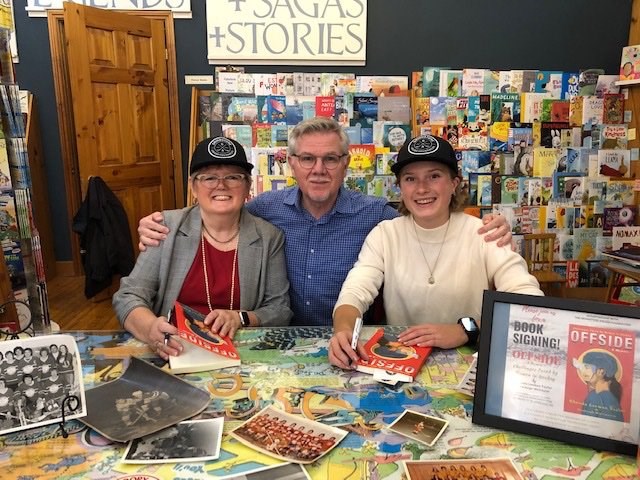“Women have never had it easy in the sports world.”
So begins Newmarket resident Rhonda Leeman Taylor’s new memoir, Offside, and, as one of the earliest trailblazers in women’s hockey, she’s certainly an authority on the subject.
Co-authored with Leeman Taylor's niece, Denbeigh Whitmarsh, Offside details the hockey pioneer’s journey from a fresh-faced 15-year-old on the Kingston Red Barons hockey team to one of the great innovators of women’s hockey history.
Love local news? Sign up for our daily headlines email newsletter.
The book is a case study in overcoming sexism and adversary on the ice, and a look at women’s hockey at a time when the sport was deliberately suppressed.
“Now that my experiences are written in this book, they can’t be lost to history,” said Leeman Taylor. “People will know how hard we had to fight to get our voices heard.”
Born in Kingston, Ontario in 1953, Leeman Taylor’s love for hockey was sparked at an early age. After years of watching hockey from the stands, a newspaper advertisement calling for female hockey players lead to her joining the Kingston Red Barons when she was 15. Eight successful playing seasons later, Leeman Taylor headed to Queen’s University, where she played with the school’s Golden Gals hockey team.
Her professional career started with a bang. After graduating from Queen’s in 1976, Leeman Taylor was hired by the Ontario Hockey Development Committee and began what would become a 20-year volunteering stint with the Ontario Women’s Hockey Association. Within three years, she was able to grow the number of teams registered with the OWHA from 101 to 203 by personally travelling across Ontario and meeting with female hockey players.
In 1980, she became the first salaried female hockey employee in Canada, working for the Hockey Ontario Development Committee, and two years later was responsible for organizing the first Women’s Canadian National Hockey Tournament.
In 1982, Leeman Taylor founded and directed the Female Council, a subsect of the Canadian Amateur Hockey Association (now Hockey Canada) that represents women’s hockey in Canada.
Amid much resistance from male coworkers, she became the first woman to sit on the organization’s board of directors.
Leeman Taylor was also responsible for banning contact from all national women’s hockey tournaments in 1983, something she says is her “proudest achievement”.
But her journey in hockey was not an easy one. As a young player, Leeman Taylor was subject to bullying and name-calling by male peers for her “unfeminine” interest in sports.
Adulthood saw her fighting the social stigma of women playing a “man’s” game, poor funding and lack of interest in women’s hockey, verbal abuse from male coworkers, and lack of media support for women’s events.
“I had a knitted doll in my office when I worked for the HODC,” said Leeman Taylor, recalling one such event. “One day I came back from lunch and one of the men had hung it from a noose above my desk.”
It was sexism, also, that caused the end of Leeman Taylor’s professional hockey career in 1984. After rejecting a male superior’s sexual advances while working with the OWHA, she was told that her career in women’s hockey was over. Soon after, her contract with the HODC with not renewed, and the OWHA informed her that they no longer wished to be affiliated with her.
Though Leeman Taylor’s playing career also ended with a debilitating spinal injury in 2004, her commitment to women’s hockey continues. A portion of the proceeds from Offside will be donated to the Grindstone Award Foundation to sponsor young girls in hockey.
“We didn’t know it at the time, but we were trailblazers,” she said.
Offside is available on Amazon and by order at all bookstores.



